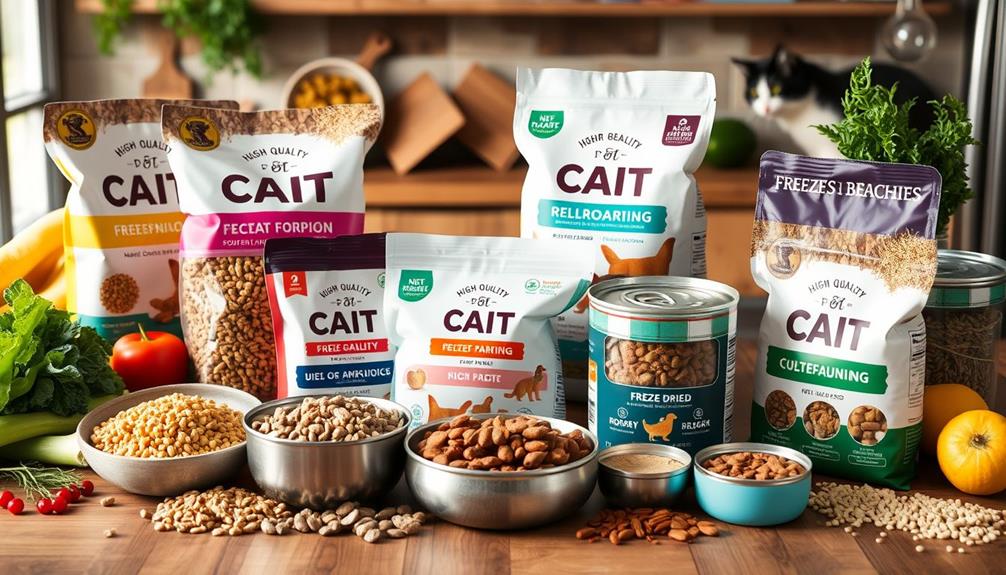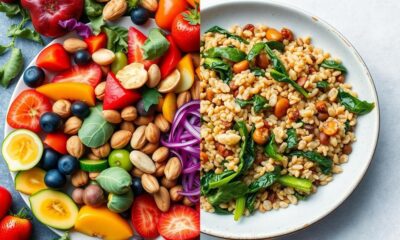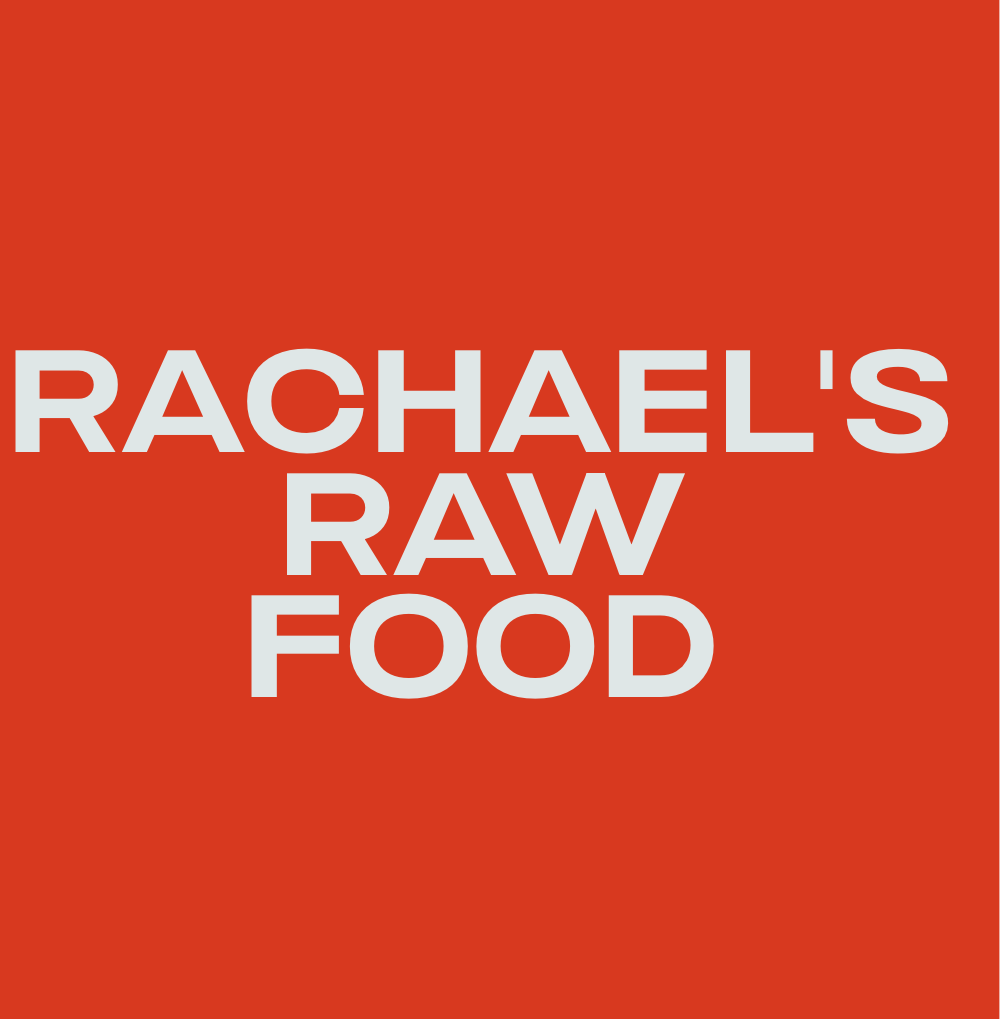Getting Started with Raw Food
Nutritionists Who Oppose The Raw Food Diet

Did you realize that not all nutritionists support the raw food diet? In reality, a significant number of nutrition professionals are against this trendy diet. As per a recent survey, 75% of nutritionists think that the raw food diet is deficient in nutritional balance, making it challenging for individuals to fulfill their dietary requirements.
This is due to the limited food choices and potential for nutrient deficiencies that can arise from excluding cooked foods from one’s diet. Furthermore, many nutritionists argue that the raw food diet can pose digestive challenges, increase the risk of foodborne illnesses, and impact bone health.
Additionally, sustaining the raw food diet long-term can be challenging for many individuals. Therefore, it is important to consider the opinions of nutritionists who advocate for individualized nutrition plans that take into account the unique needs and preferences of each person.
Key Takeaways
- Not all nutritionists support the raw food diet
- 75% of nutritionists believe the raw food diet lacks nutritional balance
- Raw food diet can lead to nutrient deficiencies and limited food choices
- Digestive challenges can occur when transitioning to a raw food diet
Lack of Nutritional Balance
You might think that by following a raw food diet, you’re getting all the essential nutrients your body needs, but in reality, you’re depriving yourself of a balanced and varied diet that is crucial for optimal health.
While raw foods can be rich in vitamins, minerals, and enzymes, they also come with certain drawbacks that can hinder nutrient absorption and negatively impact long-term health.
One of the main concerns with a raw food diet is the limited availability of certain nutrients. For instance, some nutrients, like lycopene in tomatoes or beta-carotene in carrots, are more easily absorbed by the body when they’re cooked. Heating these foods breaks down their cell walls, making the nutrients more accessible for absorption. By solely relying on raw foods, you may be missing out on these beneficial nutrients.
Furthermore, the raw food diet restricts the consumption of certain foods that are essential for a well-rounded diet. For example, legumes, whole grains, and lean meats are often avoided in a raw food diet. These foods provide important nutrients like protein, iron, and omega-3 fatty acids that are necessary for overall health and well-being. Without these food groups, deficiencies can occur, leading to potential long-term health issues.
While the raw food diet may offer some benefits, it’s important to consider the potential drawbacks. By focusing solely on raw foods, you may be limiting your nutrient intake and depriving your body of the nutritional balance it needs for optimal health. Incorporating cooked foods and a variety of food groups into your diet can help ensure you’re getting all the essential nutrients your body requires for long-term well-being.
Risk of Nutrient Deficiencies
One concern with the raw food diet is that it may lead to a lack of essential nutrients. While raw fruits and vegetables are undoubtedly healthy, it’s important to note that some nutrients are better absorbed when cooked. For example, cooking certain vegetables like tomatoes and carrots actually increases their nutrient availability.
Additionally, raw food diets often exclude certain food groups such as dairy, meat, and grains, which can further contribute to nutrient deficiencies if not carefully planned.
Another issue with the raw food diet is the potential for long-term effects on nutrient absorption. Some nutrients, like iron and zinc, are better absorbed from animal sources. By eliminating these sources from the diet, individuals following a raw food diet may be at risk for deficiencies in these essential nutrients. Furthermore, the lack of variety in a raw food diet can also contribute to nutrient deficiencies over time.
It’s important to consider these potential risks when deciding to follow a raw food diet. While it can be a healthy and beneficial way of eating, it’s crucial to ensure that all essential nutrients are being adequately met through careful planning and consideration of nutrient sources. Consulting with a registered dietitian or nutritionist can help individuals navigate the challenges of a raw food diet and ensure optimal nutrient intake for long-term health.
Digestive Challenges
While it’s true that the raw food diet offers many health benefits, some individuals may experience digestive challenges when transitioning to this eating style. These challenges can include digestive discomfort and difficulty with nutrient absorption.
Here are three reasons why these challenges may occur:
-
Lack of cooking: Cooking food can break down tough fibers and make nutrients more easily digestible. Without cooking, some individuals may find it harder to properly break down and absorb nutrients from raw foods, leading to digestive discomfort.
-
High fiber intake: Raw food diets often include a high intake of fiber from fruits, vegetables, and whole grains. While fiber is important for digestive health, consuming too much can cause bloating, gas, and other digestive issues.
-
Enzyme deficiency: Raw food diets rely on the natural enzymes present in food for digestion. However, some individuals may have enzyme deficiencies or imbalances that make it difficult for their bodies to properly break down raw foods.
It’s important to note that while these digestive challenges may occur, they’re not experienced by everyone who follows a raw food diet. Additionally, with proper planning and variety in food choices, individuals can still obtain the necessary nutrients and enjoy the benefits of a raw food diet while minimizing digestive discomfort.
Potential for Foodborne Illnesses
The potential for foodborne illnesses can be a concern when consuming uncooked or undercooked foods. While the raw food diet may have its benefits, it’s important to be aware of the risks associated with it.
Food safety should always be a top priority, and there are certain precautions that need to be taken when consuming raw foods.
One of the main concerns with the raw food diet is the risk of food poisoning. Raw foods, especially meats, poultry, seafood, and eggs, can harbor harmful bacteria such as Salmonella, E. coli, and Campylobacter. These bacteria can cause serious illnesses like diarrhea, vomiting, abdominal cramps, and in severe cases, even death. Cooking food to the appropriate temperature is one of the most effective ways to eliminate these bacteria and reduce the risk of foodborne illnesses.
Another aspect to consider is cross-contamination. When preparing raw foods, it’s important to avoid cross-contamination with other foods that will be consumed raw. Cutting boards, utensils, and countertops should be thoroughly washed and sanitized to prevent the spread of harmful bacteria.
While the raw food diet may have its benefits, it’s crucial to prioritize food safety. Proper cooking techniques and preventing cross-contamination are essential in reducing the risk of foodborne illnesses. It’s always recommended to consult with a healthcare professional or registered dietitian before making any drastic changes to your diet. Stay informed and make educated decisions to ensure your health and well-being.
Difficulty in Meeting Caloric Needs
Meeting your caloric needs can be challenging on a raw food diet. While raw foods are often praised for their nutrient density, it can be difficult to consume enough calories to meet your energy requirements.
Here are some factors to consider:
-
Food volume: Raw fruits and vegetables are typically lower in calories compared to cooked foods. This means you may need to consume a larger volume of food to meet your energy needs.
-
Digestive efficiency: Raw foods can be more difficult for your body to digest than cooked foods. This can lead to a decrease in the absorption of nutrients and energy from your diet.
-
Variety: A raw food diet often relies heavily on fruits and vegetables, which may not provide the necessary macronutrient balance to meet your caloric needs. It can be challenging to include enough sources of protein and healthy fats in your diet.
To ensure you are meeting your caloric needs on a raw food diet, it’s important to carefully plan your meals and include a wide variety of nutrient-dense foods. Incorporating sources of plant-based protein, such as legumes and nuts, and healthy fats, such as avocados and seeds, can help increase the caloric density of your meals. Consulting with a registered dietitian can also be beneficial in ensuring you’re meeting your energy requirements while following a raw food diet.
Limited Food Variety
Expanding your culinary horizons can be a thrilling adventure, but sticking to a limited range of foods may leave your taste buds feeling as bored as a sloth on a rainy day. While the raw food diet promotes the consumption of uncooked and unprocessed foods, it often lacks variety, which can be problematic for several reasons.
One of the main concerns with a limited food variety is the challenge it poses in meeting your nutritional needs. Different foods contain different essential nutrients, and by restricting your diet to a few select items, you may be missing out on important vitamins, minerals, and antioxidants. This can have a negative impact on your overall health and well-being.
Moreover, food preparation can also be a factor to consider. With a limited range of foods, it can be difficult to create diverse and exciting meals. The table below illustrates the potential monotony of a raw food diet:
| Breakfast | Lunch | Dinner |
|---|---|---|
| Fruit salad | Raw vegetable salad | Nut and seed mix |
Additionally, the limited variety of foods in a raw food diet may affect nutrient absorption. Some nutrients require specific conditions or combinations of foods to be properly absorbed by the body. By restricting your diet to certain raw foods, you may be hindering your body’s ability to absorb these necessary nutrients.
While the raw food diet may have its benefits, the limited food variety it entails can be a drawback. It is important to ensure a diverse and balanced diet to meet your nutritional needs and maximize nutrient absorption.
Impact on Bone Health
Broadening your culinary horizons and trying new foods can have a significant impact on your bone health. While the raw food diet may seem like a healthy choice, it may actually put you at risk for developing osteoporosis.
One of the main concerns with this diet is the limited variety of foods consumed, which can lead to inadequate nutrient intake. Calcium is crucial for maintaining strong bones, and it’s well known that dairy products are a great source of this mineral. However, the raw food diet restricts the consumption of dairy and other calcium-rich foods, which can negatively affect calcium absorption. Without enough calcium, your bone health may suffer, increasing your risk of osteoporosis.
Research has shown that the raw food diet is associated with lower bone mineral density, a key indicator of bone strength. In fact, studies have found that individuals following this diet have a higher risk of fractures compared to those who consume a more balanced diet. This is likely due to the lack of essential nutrients, such as calcium, that play a vital role in bone health.
To ensure proper bone health and prevent osteoporosis, it’s important to incorporate a variety of nutrient-rich foods into your diet. Including dairy products, leafy greens, fortified plant-based milk, and other calcium-rich foods can help support calcium absorption and maintain strong bones. Remember, a well-balanced diet is key to overall health, including your bone health.
Potential for Weight Loss Plateau
If you think you’re going to effortlessly shed those last few pounds by going on a raw food diet, you might be in for a surprise when your weight loss comes to a screeching halt. While the raw food diet can be effective for initial weight loss, it may not be sustainable for long-term weight loss maintenance.
This is because the body undergoes a phenomenon known as metabolic adaptation. Metabolic adaptation occurs when the body adjusts to a lower calorie intake by slowing down its metabolism. When you first start a raw food diet, you may experience rapid weight loss due to the reduced calorie intake. However, over time, your body adapts to the lower calorie intake by slowing down your metabolism, making it harder to continue losing weight.
Additionally, a raw food diet can lead to a weight loss plateau due to the lack of variety and potential nutrient deficiencies. The raw food diet primarily consists of fruits, vegetables, nuts, and seeds, which may not provide all the essential nutrients your body needs to function optimally. This can lead to cravings and overeating, further hindering your weight loss efforts.
While the raw food diet may initially lead to weight loss, it may not be a sustainable long-term solution for weight loss maintenance. The body’s metabolic adaptation and potential nutrient deficiencies can contribute to a weight loss plateau. It’s important to consult with a registered dietitian or nutritionist to ensure you’re meeting your nutritional needs while pursuing your weight loss goals.
Challenges in Sustaining the Diet Long-Term
Sustaining the raw food diet long-term poses challenges due to the body’s metabolic adaptation and the potential for nutrient deficiencies. While the raw food diet may initially lead to weight loss, the body eventually adapts to the reduced calorie intake by slowing down its metabolism. This can result in a weight loss plateau, making it difficult to continue losing weight.
In addition, the raw food diet can be restrictive and may limit the variety of foods that can be consumed. This can make it challenging to meet all of the body’s nutritional needs and may lead to deficiencies in essential nutrients such as vitamin B12, iron, and omega-3 fatty acids. These nutrient deficiencies can have negative impacts on overall health and well-being.
To illustrate the challenges of sustaining the raw food diet long-term, consider the following table:
| Sustainability Concerns | Dietary Restrictions |
|---|---|
| Metabolic adaptation | Limited food choices |
| Weight loss plateau | Nutrient deficiencies |
| Difficulty meeting nutrient needs | Potential health risks |
It is important to note that while the raw food diet may have some potential benefits, it is essential to carefully consider the sustainability concerns and dietary restrictions associated with this eating pattern. Consulting with a registered dietitian or nutritionist can provide guidance on how to meet nutritional needs while following a balanced and sustainable diet.
Importance of Individualized Nutrition Plans
Developing personalized nutrition plans is crucial in order to tailor dietary recommendations to meet individual needs, allowing for a more effective and sustainable approach to achieving optimal health and well-being.
When it comes to nutrition, there is no one-size-fits-all approach. Each person has unique dietary requirements, preferences, and restrictions that must be taken into consideration. A personalized approach takes into account factors such as age, sex, activity level, health conditions, and personal goals to create a plan that works specifically for that individual.
One of the key benefits of a personalized nutrition plan is the ability to address dietary restrictions. Many people have specific dietary needs or restrictions due to allergies, intolerances, or medical conditions. By tailoring the diet to accommodate these restrictions, individuals can still enjoy a wide variety of foods while ensuring they are meeting their nutritional needs. This can help prevent feelings of deprivation or frustration that can often arise when following a generalized approach.
Moreover, a personalized approach allows for better adherence to the diet long-term. When people feel that their dietary plan is tailored to their unique needs, they’re more likely to stick with it and make it a sustainable lifestyle change. This can lead to better overall health outcomes and a higher chance of achieving long-term success in maintaining a healthy weight and managing chronic conditions.
Developing personalized nutrition plans is essential for optimizing health and well-being. By taking into account individual needs and dietary restrictions, a personalized approach allows for a more effective and sustainable approach to achieving optimal health. So, whether you have specific dietary restrictions or just want to improve your overall health, consider working with a nutritionist to develop a personalized nutrition plan that works for you.
Frequently Asked Questions
Can the raw food diet provide all the necessary nutrients for a person’s overall health and wellbeing?
The raw food diet is controversial due to potential health risks. While it can provide some necessary nutrients, there are concerns about deficiencies in key nutrients like vitamin B12, iron, and calcium. Raw foodists must be cautious to ensure they’re meeting their nutritional needs.
Cooking certain foods can increase their bioavailability and nutrient absorption. Additionally, there’s a risk of foodborne illnesses from consuming raw or undercooked foods. Consulting with a registered dietitian can help ensure a balanced and safe approach to the raw food diet.
Are there any specific nutrients that are commonly lacking in a raw food diet?
Did you know that the raw food diet may leave you lacking in specific nutrients? While it’s true that this diet can be rich in vitamins and minerals, there are some key nutrients that may be deficient.
Common deficiencies include vitamin B12, iron, calcium, and omega-3 fatty acids. These specific nutrient deficiencies can lead to potential health risks such as anemia, weak bones, and impaired brain function.
It’s important to ensure proper supplementation and variety in your diet to mitigate these risks.
How does the raw food diet affect digestion and can it lead to digestive issues?
The raw food diet can have both positive and negative effects on digestion. On one hand, it’s believed to promote a healthy gut microbiota due to its high fiber content. However, there are concerns that the diet can lead to digestive issues. Raw foods are harder to digest, which can cause bloating, gas, and discomfort.
Additionally, some nutrients in raw foods aren’t as readily absorbed by the body, potentially leading to deficiencies.
What are the risks of consuming raw foods in terms of foodborne illnesses and how can they be minimized?
To minimize foodborne illnesses and reduce the health risks associated with a raw food diet, it’s important to take certain precautions. Firstly, ensure that all raw foods are thoroughly washed and cleaned before consumption.
Additionally, separate raw meats, poultry, and seafood from other foods to prevent cross-contamination. Cooking certain foods to a safe internal temperature can also help kill harmful bacteria.
Lastly, refrigerate perishable raw foods promptly and avoid consuming them if they’ve been left out for too long.
Is it possible to meet the daily caloric requirements on a raw food diet and what are the potential consequences of not meeting these needs?
To meet your daily caloric requirements on a raw food diet, it’s crucial to carefully plan your meals. Fruits, vegetables, nuts, and seeds can provide essential nutrients and energy. However, not meeting these needs can have consequences.
Insufficient caloric intake may lead to weight loss, fatigue, and vitamin deficiencies. It’s important to ensure adequate consumption of healthy fats and proteins to maintain energy levels and support bodily functions.
Consult a healthcare professional for personalized guidance.
Can a Raw Vegan Diet Be Safe During Pregnancy, According to Nutritionists Who Oppose the Raw Food Diet?
Many nutritionists oppose the vegan raw food pregnancy nutrition due to the risk of nutrient deficiencies and potential foodborne illness. They emphasize the importance of consulting with a healthcare professional and following a balanced diet to ensure the safety of both the mother and the baby during pregnancy.
Conclusion
In conclusion, it’s clear that while the raw food diet may have its proponents, there are numerous concerns raised by nutritionists. The lack of nutritional balance and potential for nutrient deficiencies, along with digestive challenges and the risk of foodborne illnesses, highlight the potential risks of this diet.
Additionally, meeting caloric needs and maintaining bone health may prove challenging. It’s important to remember that individualized nutrition plans are crucial for overall health and wellbeing. Therefore, it’s advisable to approach this diet with caution and seek professional guidance.
With her ability to convey complex concepts in a clear and accessible manner, Belinda ensures that readers of all backgrounds can grasp the benefits and techniques of raw food. She excels at breaking down scientific information into digestible pieces, allowing readers to understand the impact of raw food on their bodies and encouraging them to make informed choices about their diet.
One of Belinda’s notable contributions to rachaelsrawfood.com is her collection of mouthwatering recipes. She delights in experimenting with various combinations of raw ingredients, exploring innovative ways to create delicious and nutritious meals. Belinda’s recipes showcase the incredible flavors and textures of raw food and emphasize its versatility, dispelling any misconception that a raw food diet is limited or monotonous.
In addition to her writing responsibilities, Belinda actively engages with the raw food community, attending workshops, seminars, and conferences to expand her knowledge and network. She enjoys connecting with like-minded individuals, exchanging ideas, and staying up to date with the latest trends and advancements in the field of raw food nutrition.
Getting Started with Raw Food
Does Raw Food Make Dogs Constipated? Find Out Here
Observe the signs of constipation in dogs on a raw food diet; discover how to ensure their digestive health. What solutions exist?

Feeding your dog a raw food diet can indeed cause constipation if it isn't balanced right. Excessive bone content might lead to hard stools, while not including enough fiber from fruits and vegetables can worsen the issue. Dehydration is also common with raw diets, contributing to stool hardness. If you notice signs like straining to defecate or rock-hard stools, it's important to adjust the diet. Adding fiber-rich foods like pumpkin and keeping your dog hydrated are key. There's more you can do to guarantee a healthy digestion for your dog, so keep exploring options for their diet.
Key Takeaways
- Raw diets can lead to constipation due to excessive bone content resulting in hard stools.
- Insufficient fiber from a lack of fruits and vegetables can exacerbate digestive issues.
- Dehydration is common in raw diets, which contributes to stool hardness.
- Rapid transitions to a raw diet without gradual adjustments may disrupt a dog's digestion.
- Regular monitoring of stool consistency and dietary balance is essential for preventing constipation.
Understanding Dog Constipation
Constipation in dogs can be a concerning issue for pet owners, and it's important to recognize the signs early. You might notice that your dog hasn't had a bowel movement for over 24 hours, is straining while trying to defecate, or producing rock-hard stools. These symptoms indicate that your dog's digestive tract needs attention.
Diet plays an essential role in your dog's bowel health, and understanding proper hamster care can help you appreciate the importance of nutrition in pet health. If your dog is on a raw diet, insufficient fiber and excessive bone content can contribute to constipation. It's crucial to provide enough fiber to help your dog maintain regular bowel movements. Foods like pumpkin and leafy greens can be excellent additions to their diet.
Additionally, keep an eye on your dog's hydration and make sure they get plenty of exercise. Both of these factors are significant for promoting healthy digestion and preventing constipation.
If you're concerned about your dog's condition, consider adjusting their diet by reducing bone content and incorporating fiber-rich foods. By taking these steps, you can help your dog overcome constipation and support their overall health.
Causes of Constipation in Raw Diets

A raw diet can sometimes lead to constipation in dogs, primarily due to excessive bone content. When the diet consists of too many bones, it can result in hard stools that hinder regular bowel movements.
Additionally, insufficient fiber intake from a lack of fruits and vegetables can exacerbate the problem. It's essential to incorporate fiber-rich foods like pumpkin and leafy greens to support healthy digestion, as recommended in gout nutrition guidelines.
Dehydration also plays a significant role in constipation. Since raw diets often contain less moisture than processed foods, your dog may not be drinking enough water, further contributing to hard stools.
Stress, changes in routine, or dietary imbalances can influence gut motility, leading to irregular bowel movements as well.
Moreover, if you shift your pet to a raw diet too quickly without a gradual introduction of new foods, it can disrupt their digestive system. This sudden change may result in constipation or other gastrointestinal issues.
To prevent these causes of constipation, verify that your dog's raw diet is balanced and includes sufficient fiber and hydration. This way, you can help maintain your dog's digestive health.
Signs and Symptoms to Observe

Recognizing the signs and symptoms of constipation in your dog is essential for timely intervention. Pay close attention to any lack of stool for over 24 hours, as this can be a clear indication that your dog is experiencing constipation.
If you notice your dog is straining during defecation, it's vital to take action. Straining often accompanies hard stools that resemble pebbles, signaling that your dog may be in discomfort. Additionally, providing your dog with healthy snacks can promote better digestion and overall health, potentially mitigating constipation issues.
Behavioral changes can also be significant. If your dog seems reluctant to move, avoids activities they usually enjoy, or shows signs of discomfort while attempting to relieve themselves, these may be warning signs of constipation.
It's important to monitor stool consistency regularly. Hard stools can lead to further complications, so keeping an eye on your dog's bathroom habits is key.
Dietary Adjustments for Relief

Making dietary adjustments can greatly help alleviate your dog's constipation. Start by reducing the frequency of raw meaty bones in their diet, as these can lead to drier, harder stools.
Instead, focus on incorporating extra fruits and vegetables, like pumpkin or leafy greens, which provide essential fiber that aids in regulating bowel movements. Additionally, guaranteeing proper hydration is vital; consider how air quality considerations can parallel maintaining your dog's overall health, including digestive wellness.
Feeding a balanced raw diet consisting of 80% muscle meat, 10% bone, and 10% offal guarantees your dog gets adequate moisture and nutrients, promoting healthy digestion.
Pureed pumpkin or canned unsweetened pumpkin can be particularly effective, thanks to its high fiber content, making it easier for your dog to defecate without straining.
Don't forget about hydration! Make sure your dog has access to fresh water or bone broth, as regular hydration is essential for maintaining stool consistency and preventing constipation.
By making these dietary adjustments, you'll create a more balanced raw food experience that supports your dog's digestive health and helps alleviate constipation.
Supplement Options for Digestive Health

How can you enhance your dog's digestive health while minimizing constipation? Exploring effective supplement options can make a significant difference. Here are some to evaluate:
- Probiotics: These promote a diverse gut microbiome, which is essential for good digestion and can help mitigate issues such as gastrointestinal issues.
- Digestive enzymes: They help break down raw proteins and fats, improving nutrient absorption.
- Slippery elm: This natural remedy soothes the gastrointestinal tract and creates a protective mucous lining. A dosage of ¼ teaspoon per 10 lbs of body weight is recommended.
- Leafy greens: Incorporating fiber-rich foods like kale or spinach can regulate bowel movements, alleviating constipation.
- Omega-3 oil: Regular supplementation with this healthy oil supports overall digestive health and improves stool consistency.
When to Consult a Veterinarian

If your dog hasn't had a bowel movement in over 24 hours, it's time to consult a veterinarian.
It's important to keep an eye on your dog's overall behavior and health, as changes can indicate underlying issues that may require immediate attention.
Look out for persistent straining, discomfort, or any behavioral changes that indicate pain.
Addressing these signs early can help prevent more serious health issues down the line.
Additionally, emotional and psychological support available for families can be beneficial during such stressful times.
Persistent Lack of Stool
When your dog goes more than 24 hours without a stool, it's time to consult a veterinarian to rule out any serious health issues. A persistent lack of stool can indicate underlying problems that need addressing.
Here are some signs to watch for:
- Decreased energy levels or reluctance to move
- Hard, rock-like stools that signal constipation
- Straining to defecate with little or no output
- Signs of pain during attempts to relieve themselves
- Changes in appetite or behavior, indicating discomfort
If your dog's raw food diet lacks fiber, it could cause constipation, leading to infrequent dogs' bowel movements. Adding vegetables such as spinach, carrots, and sweet potatoes to their diet can help increase the fiber content and improve their digestion. It is important to consult with a veterinarian before switching to raw dog food, as they can provide guidance on the best diet for your dog’s specific needs. In some cases, adding a fiber supplement may also be necessary to ensure your dog’s digestive health.
Creating a personal budget for your pet's dietary needs can guarantee they receive the right nutrients. Loose stools can also disrupt gut health, making it essential to maintain a balanced diet.
If you notice any of these symptoms, don't hesitate to seek veterinary advice. Early intervention is key to identifying and treating the root cause of your dog's persistent lack of stool.
Delaying could complicate the situation, so it's best to act promptly. Remember, your dog's well-being depends on your vigilance in recognizing these signs!
Straining and Discomfort Signs
Straining to defecate can be a clear sign that your dog is experiencing constipation, and it's important to recognize this symptom early.Breast cancer symptoms in dogs can sometimes mimic signs of discomfort, so it's vital to differentiate between the two. If you notice your dog straining excessively or having difficulty passing stool, it's necessary to consult a veterinarian, especially if this persists. Signs of discomfort, like whining or trembling while attempting to defecate, should prompt an immediate visit to the vet.
A lack of bowel movements for more than 24 hours is a significant indicator of constipation and requires professional evaluation to rule out any underlying issues. Additionally, if your dog produces rock-hard stool consistently, this often signifies constipation, and you should seek veterinary advice.
Keep an eye on any changes in your dog's behavior; decreased activity levels or reluctance to move may also signal discomfort related to being constipated.
Addressing these signs of discomfort promptly can help prevent more serious health problems down the line. Remember, when in doubt about your dog's bowel habits or overall well-being, don't hesitate to reach out for a veterinary consultation. Your dog's health and comfort should always come first.
Behavioral Changes and Pain
Recognizing behavioral changes in your dog can provide important clues about their health, especially regarding constipation.
Similar to individuals with BPD dynamics in relationships, dogs may exhibit changes in behavior when experiencing discomfort or pain. If your dog exhibits any of the following signs, it's time to reflect on a vet consultation:
- Reluctance to move or play
- Straining and difficulty when trying to defecate
- Whining or trembling during attempts to have a bowel movement
- Rock-hard stools that are difficult to pass
- An absence of bowel movements for more than 24 hours
These signs of pain and discomfort can indicate that your dog needs immediate attention.
Straining to defecate is a clear indicator of constipation, and if your pet struggles for over a day, it may suggest a more serious underlying issue. Obvious signs of distress during defecation, such as whining, should never be ignored.
If you notice any of these behavioral changes, don't hesitate to consult your vet.
Early intervention can prevent complications and guarantee your dog's digestive health is maintained.
Frequently Asked Questions
Is It Normal for Dogs to Poop Less on a Raw Diet?
It's normal for dogs to poop less on a raw diet. You'll notice smaller, firmer stools due to higher digestibility. Just keep an eye out for any signs of constipation or distress in your dog.
How Do You Soften a Dog's Poop on a Raw Diet?
Did you know that 60% of dog owners notice firmer stools on a raw diet? To soften your dog's poop, balance their meals, add fiber, guarantee hydration, and encourage daily exercise for ideal digestive health.
What Foods Cause Dogs to Be Constipated?
Certain foods can cause constipation in dogs. High bone content, low-fiber diets, dry kibble, excessive lean meats, and non-digestible items like toys can all contribute to hard stools. Guarantee a balanced diet to prevent this.
How Long Does It Take for a Dog to Digest Raw Food and Poop?
It usually takes your dog 12 to 24 hours to digest raw food, depending on their age and size. You might notice smaller, less frequent stools due to improved nutrient absorption from the diet.
Conclusion
To sum up, while a raw food diet can be beneficial for many dogs, it can also lead to constipation if not balanced properly. Keep an eye on your pup's signs and symptoms, and make dietary adjustments as needed. If the issue persists, don't hesitate to consult your veterinarian, who can help you navigate this digestive maze. Remember, with the right approach, you can keep your dog's tummy happier than a kid in a candy store!
With her ability to convey complex concepts in a clear and accessible manner, Belinda ensures that readers of all backgrounds can grasp the benefits and techniques of raw food. She excels at breaking down scientific information into digestible pieces, allowing readers to understand the impact of raw food on their bodies and encouraging them to make informed choices about their diet.
One of Belinda’s notable contributions to rachaelsrawfood.com is her collection of mouthwatering recipes. She delights in experimenting with various combinations of raw ingredients, exploring innovative ways to create delicious and nutritious meals. Belinda’s recipes showcase the incredible flavors and textures of raw food and emphasize its versatility, dispelling any misconception that a raw food diet is limited or monotonous.
In addition to her writing responsibilities, Belinda actively engages with the raw food community, attending workshops, seminars, and conferences to expand her knowledge and network. She enjoys connecting with like-minded individuals, exchanging ideas, and staying up to date with the latest trends and advancements in the field of raw food nutrition.
Getting Started with Raw Food
Why Is Raw Food Bad for Cats? Essential Information
Overlooking the dangers of raw food diets for cats can lead to serious health risks; discover what you need to know for your feline’s safety.

Feeding your cat a raw food diet can be risky due to harmful bacteria like Salmonella and E. coli, which can cause severe gastrointestinal issues such as vomiting and diarrhea. About 25% of raw pet food samples have tested positive for these pathogens. Additionally, raw diets often lack essential nutrients like taurine, which can lead to serious health problems over time. Contamination during preparation increases health risks not just for your cat but for humans as well. Safety practices are vital if you decide to go this route, but there are safer, balanced alternatives that might better meet your cat's needs.
Key Takeaways
- Raw food diets can expose cats to harmful pathogens like Salmonella and E. coli, posing health risks to both pets and humans.
- Nutritional deficiencies are common in raw diets, lacking essential nutrients necessary for a cat's overall health and development.
- Improper preparation and handling of raw food increase the risk of contamination, leading to severe gastrointestinal issues in cats.
- Cats can be asymptomatic carriers of pathogens, increasing the risk of transmitting infections to humans through raw food.
- High-quality commercial cat foods offer balanced nutrition and are safer alternatives, minimizing health risks associated with raw diets.
Health Risks of Raw Food
When considering a raw food diet for your cat, it's vital to understand the health risks involved. Raw food diets can carry significant contamination risks with harmful pathogens such as Salmonella and E. coli. Studies indicate that nearly 25% of raw pet food samples test positive for these bacteria. The CDC estimates that there are about 1.2 million annual cases of foodborne salmonellosis in the U.S., and your cat could act as an asymptomatic carrier, increasing the risk of human exposure.
Additionally, just as in financial planning for elderly care, understanding the long-term impact of dietary choices is important for maintaining overall health and well-being.
Moreover, Listeria monocytogenes, another pathogen found in raw diets, poses serious dangers, especially for vulnerable populations like pregnant women and newborns. Cats fed raw diets may experience gastrointestinal issues such as vomiting and diarrhea, which can lead to severe health consequences for both them and their human caregivers.
Veterinary organizations like the CDC and AVMA strongly advise against raw diets due to these health risks. They emphasize the importance of safe handling practices to minimize contamination, but even with precautions, the dangers of raw pet food remain significant.
Ultimately, you must weigh these risks carefully when considering your cat's diet.
Nutritional Concerns

Cats thrive on balanced nutrition, but raw food diets often fall short in providing essential nutrients. Many raw food diets lack essential components like taurine, vitamins A, D, and E, which are critical for your cat's health. Without these essential nutrients, your feline friend could face serious nutritional deficiencies that lead to health issues over time.
Furthermore, it's important to understand the implications of dietary choices on overall health and wellness, as proper budgeting for pet care guarantees your cat receives the best nutrition possible.
Homemade raw diets frequently miss the mark on meeting complete and balanced nutritional requirements. This oversight can result in calcium imbalances, affecting bone health and overall development, particularly in growing cats. In adult cats, these imbalances can also lead to significant health concerns.
Additionally, without veterinary guidance, feeding your cat a raw food diet can be risky. Only a small percentage of analyzed homemade raw diets have been found to be complete and balanced. The potential for harmful bacteria in raw diets can further complicate nutritional adequacy, as it may contribute to nutrient loss.
To guarantee your cat receives the balanced diet they need, consult with a veterinarian before making any changes to their diet, especially if you're considering raw food options.
Pathogen Contamination

Feeding your cat a raw food diet can open the door to serious health risks, particularly due to pathogen contamination. Studies show that nearly 25% of raw cat food samples are contaminated with harmful bacteria, including Salmonella and Listeria.
These pathogens can pose significant risks not only to your cat but also to your household. Pets with emotional dysregulation, such as those with BPD dynamics in relationships, may also exhibit increased anxiety, making them more vulnerable to health issues.
Salmonella, for instance, causes around 1.2 million human infections each year, with cats often acting as asymptomatic carriers, increasing the chance of transmission to humans.
Listeria monocytogenes, another common threat in raw diets, leads to severe foodborne illnesses, contributing to approximately 1,600 cases and 260 deaths annually in the US. The risks escalate, especially in households with young children or immunocompromised individuals, as they're more vulnerable to these pathogens.
Improper preparation and handling raw food can exacerbate the risks of contamination, making it critical to understand the serious implications of a raw diet.
While your cat may enjoy the taste, the potential health hazards from contaminated raw cat food can lead to dire consequences for both your pet and your family.
Safe Handling Practices

Practicing safe handling techniques is vital to minimize the risks associated with feeding your cat a raw food diet. As a pet parent, you need to be vigilant about harmful bacteria like Salmonella and Listeria that can thrive in raw cat food.
Regularly monitoring your cat's health for any signs of illness can also be beneficial, as certain dietary choices may impact their well-being, including ultimate hamster care. Always wash your hands thoroughly with soap and water after handling any raw food. This simple step helps prevent the spread of these pathogens.
To guarantee a safe environment, clean and disinfect all surfaces, utensils, and feeding dishes that come into contact with raw food. Remember to store raw cat food in the freezer until you're ready to use it, and thaw it safely in the refrigerator or microwave. This prevents bacterial growth and keeps your cat's nutritional needs in check.
Keep raw cat food separate from human food items during storage and preparation to avoid cross-contamination. It's also important to avoid rinsing raw meat before preparation, as this can cause splashing and spread bacteria to surrounding surfaces and utensils.
Alternatives to Raw Diets

When considering alternatives to raw diets, many pet owners find themselves weighing the benefits of high-quality commercial foods. These commercially prepared options, formulated by veterinary nutritionists, provide a complete and balanced diet that meets your cat's nutritional needs without the risks associated with raw feeding.
Additionally, some commercial diets are specifically designed to support urinary health, which is essential for preventing common feline health issues recommendations for usage based on symptoms.
Cooked food is another excellent choice. It can be tailored to eliminate harmful bacteria, making it a safer alternative to raw diets. High-quality canned cat foods often have higher moisture content, supporting hydration and benefiting your cat's urinary health.
If your cat has food sensitivities or allergies, you might explore limited ingredient diets (LID) or hypoallergenic commercial foods. These options provide safe alternatives without the dangers linked to raw diets.
It's vital to consult with a veterinarian when making dietary changes. They can guide you in selecting high-quality commercial diets or cooked homemade meals that align with your cat's health needs.
Frequently Asked Questions
Why Is Raw Food Bad for Cats?
Raw food diets can expose your cat to harmful bacteria and nutritional deficiencies. They often lack essential nutrients, and unprocessed bones might cause serious injuries. It's best to stick to balanced, vet-recommended diets for your cat's health.
Why Do Vets Say Raw Food Is Bad?
Oh sure, let's serve your cat raw meat like a gourmet delicacy! Vets warn against it because of bacteria, nutrient deficiencies, and potential harm to both your pet and your family. Cooked food's safer, trust them!
Do Vets Recommend a Raw Diet for Cats?
Most vets don't recommend a raw diet for cats due to health risks like bacterial contamination and nutritional imbalances. They suggest opting for high-quality commercial cat foods to guarantee your pet's health and well-being.
What Are the Dangers of Raw Food?
Raw food diets can expose your cat to harmful bacteria like Salmonella and E. coli, leading to severe illness. They might also cause nutrient deficiencies and pose choking hazards from unprocessed bones, risking your cat's health. Additionally, raw food diets can lead to potential dental issues and digestive problems for cats. In fact, some studies have linked raw food diets to an increased risk of tooth decay and gum disease in cats. Furthermore, it’s important to note that raw food and dog constipation can also be a concern, as the lack of fiber in raw diets can lead to bowel irregularities and discomfort for pets. Therefore, it’s crucial to carefully consider the potential risks before deciding to switch your cat to a raw food diet.
Conclusion
In the grand tapestry of feline nutrition, raw food might seem like a tempting thread, but it can unravel quickly with health risks and nutritional concerns. While the allure of a raw diet is strong, remember the hidden dangers lurking within pathogens that can harm your cat. By exploring safer alternatives, you can guarantee your furry friend thrives. After all, a happy cat is a healthy cat, and that's the purrfect goal for every pet owner!
With her ability to convey complex concepts in a clear and accessible manner, Belinda ensures that readers of all backgrounds can grasp the benefits and techniques of raw food. She excels at breaking down scientific information into digestible pieces, allowing readers to understand the impact of raw food on their bodies and encouraging them to make informed choices about their diet.
One of Belinda’s notable contributions to rachaelsrawfood.com is her collection of mouthwatering recipes. She delights in experimenting with various combinations of raw ingredients, exploring innovative ways to create delicious and nutritious meals. Belinda’s recipes showcase the incredible flavors and textures of raw food and emphasize its versatility, dispelling any misconception that a raw food diet is limited or monotonous.
In addition to her writing responsibilities, Belinda actively engages with the raw food community, attending workshops, seminars, and conferences to expand her knowledge and network. She enjoys connecting with like-minded individuals, exchanging ideas, and staying up to date with the latest trends and advancements in the field of raw food nutrition.
Kitchen Essentials for Raw Food Preparation
Which Raw Food Should Be Stored Above? Essential Tips
Learn the crucial hierarchy of raw food storage to prevent cross-contamination and ensure safety—discover the essential tips that could change your kitchen practices!

When organizing your refrigerator, always store raw fish on the top shelf. This placement minimizes the risk of cross-contamination with other foods. It's essential to wrap the fish tightly in plastic wrap or foil and keep it in a sealed container to prevent exposure to contaminants. Below the fish, you can store whole cuts of beef and pork on the middle shelf, while ground meats go lower. Finally, raw poultry should be on the bottom shelf to avoid any leakage. Understanding these storage tips can greatly enhance your food safety practices. You'll discover even more helpful advice ahead.
Key Takeaways
- Store raw fish on the top shelf to minimize the risk of cross-contamination with other foods.
- Whole cuts of beef and pork should be placed directly below fish on the middle shelf.
- Ground meats must be stored on the lower middle shelf, beneath whole cuts of beef and pork.
- Raw poultry should always be kept on the bottom shelf to prevent juices from contaminating other items.
- Use sealed containers for all raw foods to further reduce the risk of contamination.
Importance of Food Hierarchy
When it comes to food storage, understanding the importance of food hierarchy is vital for maintaining safety in your kitchen. By organizing your refrigerator correctly, you can minimize the risk of cross-contamination, which is essential for raw food safety. Proper food storage practices can help ward off foodborne illnesses, similar to how cold medications should be chosen for effective relief.
Start with seafood, which should always be stored on the top shelf. It's the most perishable and should be kept above other raw foods to prevent any juices from dripping down.
Next, place whole cuts of beef and pork on the middle shelf. This keeps them safely above ground meats and seafood, adhering to the food storage hierarchy. Ground meats and fish should be stored on the lower middle shelf, where they can be contained separately from poultry, which you must always put on the bottom shelf. This prevents any juices from raw poultry from contaminating other foods, markedly reducing cross-contamination risks.
Following this organization not only minimizes the chances of foodborne illnesses but also makes it easier to access your ingredients when cooking. By adhering to these guidelines, you guarantee that your kitchen remains safe and efficient while handling raw foods.
Storing Fish Correctly

When storing fish, it's vital to prioritize proper storage techniques to keep it fresh and safe.
You should always maintain the right temperature and take steps to prevent cross-contamination, especially with other raw foods.
Regular cleaning of storage areas is essential to guarantee hygiene and minimize the risk of foodborne illnesses.
Importance of Proper Storage
Storing fish correctly is essential for maintaining its freshness and guaranteeing food safety. To prevent contamination, always place fish on the top shelf of your refrigerator. This helps minimize the risk of juices leaking from raw meats or poultry stored below, which could spoil your fish.
Additionally, consider incorporating aquatic exercise into your routine, as it promotes overall health which is beneficial when handling and preparing food. Wrapping your fish tightly in plastic wrap or aluminum foil is important, as it prevents exposure to contaminants and helps maintain its quality.
Be certain to store fish in a sealed container, keeping it separate from raw meats and poultry. This extra layer of protection further reduces the risk of cross-contamination.
Regularly check the use-by dates on your fish to verify you're consuming it while it's still safe. Proper refrigeration is essential; keep your fish at or below 5 °C to inhibit harmful bacteria growth.
Temperature Control Guidelines
Maintaining the right temperature is essential for guaranteeing your fish stays fresh and safe to eat. Store your fish on the top shelf of the fridge to avoid cross-contamination with other raw foods like beef and pork. The ideal storage temperature for fish is below 5 °C, which helps minimize bacterial growth and keeps it fresh.
Here's a quick overview of proper fish storage:
| Storage Guidelines | Details |
|---|---|
| Ideal Temperature | Below 5 °C |
| Storage Location | Top shelf of the fridge |
| Wrap | Tightly in plastic wrap or aluminum foil |
| Below Fish | Whole cuts of beef and pork |
Always check the temperature of your fridge regularly to guarantee it stays at or below that critical level. Wrapping your fish tightly prevents exposure to contaminants, further maintaining its quality. Following these temperature control guidelines will help keep your fish safe and delicious for you and your family.
Cross-Contamination Prevention Strategies
To keep your fish safe from cross-contamination, always place it on the top shelf of your refrigerator. This prevents fish juices from dripping onto other raw foods, reducing the risk of spoilage and bacteria spreading.
Proper food handling and storage practices are fundamental to maintaining a safe kitchen environment, especially when it comes to preventing cross-contact with other raw ingredients.
Here are three fundamental strategies for storing fish correctly:
- Use a Sealed Container: Store your fish in a well-sealed container or tightly wrapped to minimize any leakage. This is critical in preventing cross-contamination with other foods.
- Separate Storage: Always keep fish separate from raw poultry and meats. These should be placed on the lower shelves to avoid any drips that could contaminate the fish.
- Monitor Temperature: Verify your refrigerator maintains a temperature of 5 °C or below. This is essential for temperature management and helps inhibit bacterial growth, keeping your fish fresh longer.
Regularly check your fish for signs of spoilage and consume or cook it within a safe timeframe.
Poultry Safety Practices

When it comes to poultry safety, proper storage is key to preventing foodborne illnesses. Always store raw poultry on the bottom shelf of your fridge to avoid cross-contamination, and make sure it's in a sealed container.
Additionally, understanding the importance of budgeting for food expenses can help you manage your grocery costs effectively.
Keeping poultry at safe cooking temperatures is just as important—let's explore how to do this effectively.
Proper Storage Hierarchy
Properly organizing your refrigerator is vital for poultry safety and overall food hygiene. Establishing a clear storage hierarchy helps prevent cross-contamination and guarantees your food stays safe.
For instance, keeping your raw meats properly stored can greatly reduce the risk of foodborne illnesses, as noted in hamster care and costs regarding proper food handling.
Here's how you can organize your raw foods effectively:
- Top Shelf: Store whole fish here. Keeping it above all other raw foods minimizes cross-contamination risks.
- Middle Shelf: Place whole cuts of beef and pork on this level, guaranteeing they're below fish but above ground meats. This organization helps maintain proper cooking temperature guidelines.
- Bottom Shelf: Raw poultry belongs here to prevent its juices from dripping onto other foods, especially ready-to-eat items located above.
Always wrap your raw foods securely in plastic wrap or aluminum foil to prevent leakage and contamination within the fridge.
By following this structured organization, you greatly reduce the chances of harmful bacteria spreading among your food.
Avoid Cross-Contamination Techniques
Cross-contamination is a serious concern in the kitchen, especially with raw poultry. To guarantee food safety, always store raw poultry on the bottom shelf of your refrigerator. This prevents its juices from dripping onto other foods, which can lead to harmful bacteria spreading. Use a sealed container or plastic bag to minimize any risk of leakage.
Early detection of foodborne illnesses can be vital, much like the importance of mammography for early detection in breast cancer.
It's essential to follow the food hierarchy; store raw poultry above raw meats and seafood. This simple step can considerably reduce the risk of cross-contamination. When preparing meals, always use separate cutting boards for raw poultry and other ingredients to avoid cross-contact of pathogens like Salmonella.
Maintaining proper refrigeration temperatures is vital, too—ideally below 5 °C. This inhibits the growth of harmful bacteria that can thrive in warmer environments. Regularly check your refrigerator to guarantee it's keeping the right temperatures.
Safe Cooking Temperatures
Cooking poultry safely is vital for preventing foodborne illnesses. To guarantee you're cooking your poultry properly, always check the internal temperature with a food thermometer. The safe cooking temperature for all poultry products, including whole birds and ground poultry, is 165°F (74°C).
It's essential to maintain a clean cooking environment and utilize proper food storage practices for peak safety, especially if you have pets that might introduce allergens into your home, as best vacuums for dust removal in 2024 can help eliminate any lingering particles.
Here are some key tips to follow:
- Store Raw Poultry: Always keep raw poultry on the bottom shelf of your fridge to prevent juices dripping onto other foods and causing cross-contamination.
- Thawing Methods: Thaw frozen poultry safely in the refrigerator, in cold water, or in the microwave. Avoid thawing at room temperature to minimize bacterial growth.
- Leftover Cooked Poultry: Refrigerate any leftover cooked poultry within two hours of cooking. Consume it within 3-4 days for peak food safety.
Managing Raw Meat Storage

When it comes to managing raw meat storage, organization is key to ensuring food safety.
Start by storing fish on the top shelf of your refrigerator. This placement minimizes the risk of contamination with other raw foods.
It's also important to maintain a clean refrigerator environment to prevent any airborne bacteria from settling on surfaces, much like the air purifier maintenance dos and don'ts.
Below the fish, place whole cuts of beef and pork on the middle shelf. This arrangement prevents any drips that could potentially contaminate lower shelves.
Ground meats, including beef and pork, should occupy a lower shelf to reduce the risk of bacterial spread from their juices.
Preventing Cross-Contamination

Maintaining a safe food environment means taking steps to prevent cross-contamination in your kitchen. To keep harmful bacteria at bay, you need to store raw foods correctly and guarantee that they're separate from cooked foods. Here are some essential tips to help you achieve that:
1. Store Raw Foods in Order: Always place fish at the top, followed by whole cuts of beef or pork, ground meats, and finally poultry at the bottom. This arrangement minimizes the risk of drips and leakage contaminating other items. Additionally, it’s important to store raw foods in sealed containers or leak-proof bags to further prevent cross-contamination. When storing raw foods in the refrigerator, always keep them separate from ready-to-eat items, and use different cutting boards and utensils for preparing raw meats and other foods. Following these raw food storage tips can help reduce the risk of foodborne illness and keep your kitchen safe.
Additionally, just as proper maintenance is vital for heat pumps to function effectively, maintaining proper food storage practices is fundamental for food safety.
2. Use Sealed Containers: Keep raw foods in sealed containers or plastic bags. This greatly reduces the chances of leakage, which can spread harmful bacteria and lead to foodborne illnesses.
Using sealed containers is similar to how energy-saving features in heat pumps help minimize inefficiencies and enhance performance.
3. Organize Food Storage: Regularly check and organize your food storage. Confirm that cooked foods are always stored above raw items to maintain that vital separation.
Food Safety Guidelines

Food safety guidelines are essential for guaranteeing that your raw ingredients remain safe to eat and won't lead to foodborne illnesses. To maintain a safe storage hierarchy, place raw fish at the top of your refrigerator. This minimizes the risk of cross-contamination from its juices.
Additionally, understanding the importance of proper food handling can greatly reduce health risks associated with foodborne pathogens, similar to the ways caregivers manage financial considerations for elderly care to guarantee safety and well-being.
Below the fish, store whole cuts of beef and pork, which are less likely to harbor harmful bacteria compared to ground meats. Ground meats, like ground beef and pork, should be stored beneath whole cuts to prevent bacterial spread.
Finally, keep raw poultry—such as whole and ground chicken—on the bottom shelf, as it poses the highest risk of carrying pathogens like salmonella.
Always wrap your raw foods securely in aluminum foil or plastic wrap. This prevents exposure to contaminants and avoids any leakage that could affect other foods in your fridge.
Best Storage Containers

Choosing the right storage containers can make a big difference in keeping your raw foods safe and fresh. To effectively prevent cross-contamination and maintain the quality of your ingredients, consider these tips:
- Use airtight containers: Opt for glass or BPA-free plastic containers with tight-fitting lids. They not only prevent leaks but also keep odors from mingling and help maintain freshness.
- Label everything: Clearly label your storage containers with the contents and date of storage. This practice guarantees you track use-by dates and minimizes the risk of using spoiled food.
- Create visual distinction: Utilize separate colored containers for different food groups like raw meat, poultry, and seafood. This method aids in easily identifying contents and greatly reduces cross-contamination risks.
For freezer use, choose thicker food storage bags designed for that purpose. They're less likely to puncture or leak, guaranteeing your raw foods stay safe.
Frequently Asked Questions
Which Raw Food Should Be Stored Above?
When storing raw foods, you should place whole fish on the top shelf. This helps reduce cross-contamination risks. Remember to wrap them securely to prevent any leaks that could affect other items below.
Which Food Should Be Stored Above?
Imagine the chaos of a kitchen gone wrong. You should store fish on the top shelf to prevent cross-contamination. It's essential for maintaining safety, ensuring your meals are delicious and free from any harmful bacteria.
Which Food Should Be Stored Above Others in the Refrigerator?
When storing food in your refrigerator, always place fish on the top shelf. It minimizes cross-contamination risks. Below that, keep whole cuts of beef and pork, followed by ground meats and poultry on the bottom.
What Is the Proper Way of Storing Raw Food?
Imagine your fridge as a well-organized library. When storing raw food, wrap it tightly, use sealed containers, and arrange by type. This keeps everything fresh and prevents contamination, just like protecting valuable books from damage.
Conclusion
By understanding the importance of food hierarchy and proper storage techniques, you can keep your kitchen safe and your meals delicious. Just like stacking building blocks, each layer of food needs to be placed thoughtfully to prevent disaster. Remember to store fish above poultry, and always keep raw meat at the bottom. With these tips, you'll guarantee freshness while protecting your loved ones from cross-contamination. Your kitchen can be a safe haven for healthy eating!
Rachael, the Editor in Chief of RachaelsRawFood.com, is an inspiring and passionate individual who has dedicated her life to promoting the benefits of a raw food lifestyle. Known for her vibrant and energetic personality, Rachael has built a strong online presence that has transformed her personal journey into a thriving community of raw food enthusiasts.
-

 Health and Wellness2 months ago
Health and Wellness2 months agoDoes Eating Raw Food Help You Lose Weight? Discover the Truth
-

 Kitchen Essentials for Raw Food Preparation1 month ago
Kitchen Essentials for Raw Food Preparation1 month agoCan You Cook Raw Food in an Air Fryer? Discover the Possibilities
-

 Raw Food Recipes2 months ago
Raw Food Recipes2 months agoHow Much Raw Food to Feed Your Puppy: Essential Tips
-

 Raw Food Recipes2 months ago
Raw Food Recipes2 months agoHow to Defrost Dog Raw Food Properly
-

 Health and Wellness2 months ago
Health and Wellness2 months agoHow Long Does It Take Bacteria to Spread From Raw Food? Essential Info
-

 Raw Food Recipes2 months ago
Raw Food Recipes2 months agoRaw Food Vs. Vegan: Which Diet Is Better?
-

 Raw Food Recipes2 months ago
Raw Food Recipes2 months agoIs Raw Food Good for Cats? Find Out Here
-

 Kitchen Essentials for Raw Food Preparation4 weeks ago
Kitchen Essentials for Raw Food Preparation4 weeks agoWhich Raw Food Should Be Stored Above? Essential Tips




















